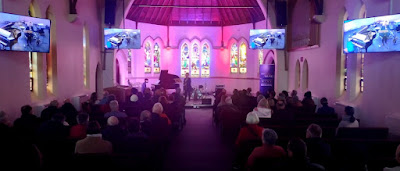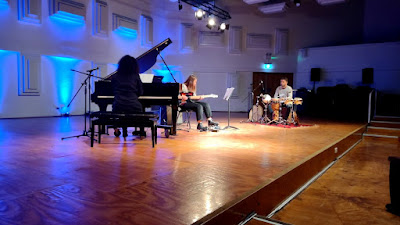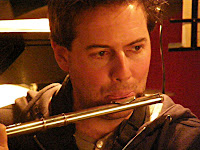I wasn't the only one who wouldn't miss such an impressive selection of Melbourne jazzers visiting Canberra. Smiths was packed and we got a show of a special intensity and beauty. I was wondering what to expect, but from the first notes the front line of trumpet, alto and tenor was bell-like with precise harmonies and interpretations and the written lines were a dream, rich and varied with sometimes unexpected twists of intervals or chords. Just lovely. The back line was as impressive, steady and precisely intoned bass (it's a concern with my playing at the moment so I can only admire Sam's intonation) and exploratory drums and richly effected guitar and of course the joyous smile and rich complexity of Andrea Keller on our Smith's piano. Along with Andrea and leader Sam Anning, the players were Mat Jodrell, Carl Mackey, Julien Wilson, Theo Corbo and a newby for me, Kyrie Anderson. Enough said. This was not a night of flashy solos, but the solos were did hear were perfectly formed things, adorned only as required, stunning and beauteous. They were launching Sam's new album, the third from his septet, a tribute to Archie Roach who he played with for 3 years and who he obviously admired immensely. And the players on the night were the band on the album, so we got their awareness of the music and, from the top, a clarity and presence that was studio-like. They played acoustic, or at least all but bass, guitar, piano did, and yet it could be very loud from my pretty close seat. Acoustic, so sadly no mix on my part. I complimented Sam on his compositions after. I think I can mention that he does an exercise of writing five themes in 30 mins and these often join into a tune or otherwise lead to one. So this is music based, rather than lyrical, but there was one poem recited at the end of one piece and at least one piece had an obvious theme, of music and life partners Ruby Hunter and Archie, written after the death of Ruby. I hope I don't offend or break protocol in mentioning these names, but they were mentioned openly at the gig and were the theme of the album. This piece was light and joyous and bouncy and quite different from many others, which more seemed in tune with the album title, Earthen, and Archie's comments and Aboriginal Australia's relationship to country. Whatever, this was a stunningly capable and emotionally-rich concert to launch the album and I was not alone in my admiration.
Sam Anning (bass, composer) launched his new album dedicated to Uncle Archie Roach at Smiths with fellow composers and recording artists Mat Jodrell (trumpet), Carl Mackey (alto saxophone), Julien Wilson (tenor saxophone), Andrea Keller (piano), Theo Carbo (guitar) and Kyrie Anderson (drums).






























